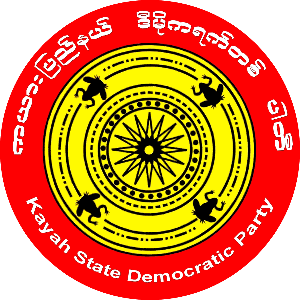 |
|---|
Government
|
Judiciary
|
Exiled government
|
Related topics |
The Kayah National Unity League was a political party in Burma.
 |
|---|
The Kayah National Unity League was a political party in Burma.
Established as an ally of the Clean AFPFL (the Kayah Democratic League allied itself with the Stable AFPFL), [1] the party represented the Kayah of Karen and Shan states. In the 1960 general elections it won a single seat.

Nu, commonly known as U Nu and also by the honorific name Thakin Nu, was a prominent Burmese statesman and the first Prime Minister of Union of Burma. He was educated at Rangoon University, where he developed his political ideas and became actively involved in the student movement. Nu's involvement in the nationalist movement deepened during his university years, and he quickly emerged as a leading figure advocating for Burma's independence from British colonial rule.

The Anti-Fascist People's Freedom League (AFPFL) was a broad popular front that ruled Burma between 1947 and 1958. It included both political parties and trade unions as members.

Ba Swe was the second Prime Minister of Burma. He was a leading Burmese politician during the decade after the country gained its independence from Britain in 1948. He held the position of prime minister from 12 June 1956 to 28 February 1957. When Ba Swe became prime minister, Time magazine reported the news in an article titled: 'The Day of the Tiger' based on his nickname 'Big Tiger' since his university days in the 1930s as a student leader.

The Burma Muslim Congress (BMC) was a Muslim political party in Burma.
The Burma Socialist Party, initially known as the People's Freedom (Socialist) Party or PF(S)P, was a political party in Burma. It was the dominant party in Burmese politics after 1948, and the dominant political force inside the Anti-Fascist People's Freedom League. Because of its inclusion in AFPFL, it was colloquially known as ဖဆဆိုရှယ်.
The Trade Union Congress (Burma) was a central trade union organization in Burma. The TUC(B) was founded by the Socialist Party in November 1945, in an attempt to counter the influence of the communist-led All Burma Trade Union Congress. Ba Cho was the President of TUC(B). The TUC(B) was an affiliate of the governing Anti-Fascist People's Freedom League.

The National United Front was a political alliance in Myanmar.

General elections were held in Burma to vote for 202 out of 250 seats to the Burmese Chamber of Deputies; the remaining 48 members were elected unopposed as no opposition candidates stood against them.

The Shan Nationalities League for Democracy is a de-registered political party in Myanmar (Burma). The party was established on 26 October 1988, and campaigns for the interests of the Shan people. The SNLD became the largest Shan party in the Assembly of the Union following the 2015 general election. The party is a federal party having local branches in most townships in Shan State and few in other states and regions such as Kayah, Kachin, and Mandalay.

The Communist Party of Burma (CPB), also known as the Burma Communist Party (BCP), is an underground communist party in Myanmar. It is the oldest existing political party in the country.

The Communist Party (Burma) (Burmese: ကွန်မြူနစ်ပါတီ (ဗမာပြည်)), sometimes referred to as the Red Flag Communist Party (Burmese: အလံနီကွန်မြူနစ်ပါတီ; RFCP), was a communist party in Burma. The party was formed after a more radical faction broke away from the Communist Party of Burma in 1946. In the same year, it began a protracted armed insurgency; first against British rule, then against the Burmese government. The party was led by Thakin Soe, a firebrand communist leader. In the 1970s, the party lost influence and was militarily defeated by 1978.
The 1962 Burmese coup d'état marked the beginning of one-party rule in Burma (Myanmar) and the political dominance of the military in Burmese politics. In the 2 March 1962 coup, the military replaced the civilian AFPFL-government headed by Prime Minister U Nu, along with the Union Revolutionary Council Chaired by General Ne Win.

The Chin Hills Congress was a political party in Burma.

The Kayah Democratic League was a political party in Burma.

The People's Educational and Cultural Development Organisation was a political party in Burma.

The United Hill People's Congress was a political party in Burma.

The Union Party was the ruling political party in Burma in the late 1950s and early 1960s. Formed by a split in the Anti-Fascist People's Freedom League, it was initially known as the Clean Anti-Fascist People's Freedom League or Nu-Tin faction.

The Stable Anti-Fascist People's Freedom League was a political party in Burma.

The Kayah State Democratic Party (KySDP) is a de-registered political party in Myanmar seeking to represent the interests of the Karenni people. It was founded in 2017 as a merger between the All Nationals' Democracy Party and Kayah Unity Democracy Party. The KySDP ran 30 candidates in the 2020 general election and won eight seats. On 28 March 2022, KySDP was officially dissolved by the junta-appointed Union Election Commission, along with 39 other parties.